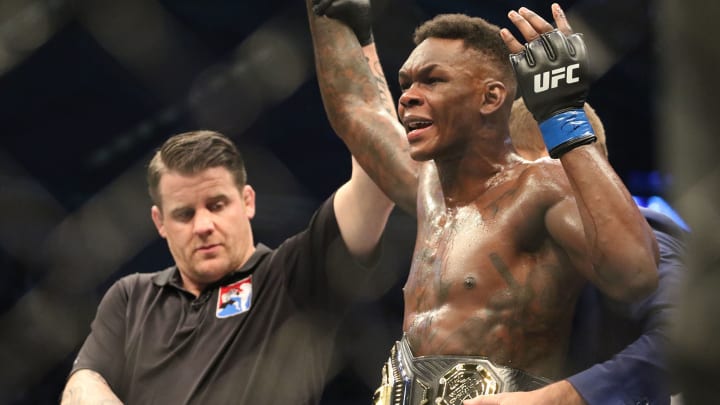Israel Adesanya Q&A: Jon Jones, Yoel Romero, mental health, and much more

UFC middleweight champion Israel Adesanya is not necessarily the type of fighter who likes to hold grudges.
“There doesn’t need to be hatred after a fight, because it’s all said and done,” Adesanya told Sports Illustrated earlier this month. “I’m cool with a lot of my opponents in the UFC. There’s people I’ve fought who were my friends in kickboxing tournaments and after we were still cool. I’m going to one of their weddings in two weeks.”
Adesanya doesn’t typically portray himself as the kind of person who would join a group rendition of “Shout” toward the end of the reception. “The Last Stylebender” is undefeated in seven UFC bouts, and says he has no reservations about punching those same opponents he considers friends square in the face.
“I’ve said this before, I would fight my grandmother if I had to. And she’s dead,“ Adesanya told SI with a laugh.
The Nigerian native will be facing a much more lively fighter at UFC 248, when he will defend his title against middleweight stalwart Yoel Romero. The leadup to Adesanya’s first fight of 2020 has been characterized by his unrelenting confidence, and continued verbal sparring between him and light heavyweight champ Jon Jones. In a phone call with SI, Adesanya discussed the Jones beef, his upcoming fight, the importance of mental health, and much more.

Rohan Nadkarni: I heard you say in an interview that every fighter, even someone like Romero, has their weak spots. How do you find them? Can you train for it, or does it only happen once you step into the octagon?
Israel Adesanya: That’s from experience to be honest. And once you’re in the octagon with them. You figure out what they’re protecting, what they’re tentative toward when you hit them in that spot. It’s a feel thing. It’s an energy thing. Once you’ve experienced combat like myself over the last years, you get privy to it.
RN: Will you train differently for someone like Romero, or will you only focus on what you do?
IA: Exactly, I do what I do. Only thing train differently for him may be the ammunition. The ammunition of certain strikes that he may be susceptible to. But at the same time we’re just focused on ourselves to be better martial artists.
RN: You’ve said you want to honor your weight class before a potential superfight with Jon Jones. Where does that sense of respect for your weight class come from?
IA: I mean, the division itself was held up by the former champion. He took a hiatus from injury, pull outs and what not. Guys like Anderson Silva, even Jon Jones himself, never moved up in weight instantly. It’s the old school way. It’s the right way, I feel. Don’t just win the belt and then go do a superfight. It’s some killers in your division first. Clean it out, establish yourself as the champion properly, and then you can move up and do the superfight. Granted guys like Conor [McGregor] have done it, but that’s because it was good for the sport at the time. For me, I want to keep it old school, I want to keep it raw. I want to keep it the way it should be.
RN: How do you weigh the risk of defending the belt versus going straight for the superfight?
IA: That’s a gamble for most people. That’s why they jump straight away because they don’t want to lose the belt. When you have the confidence of someone like myself, and you know what you can do, and you know the hard road it takes to get to a point like that, it’s no problem.
RN: You told my colleague Jon Wertheim you started seeing a therapist after winning your first fight because you still felt sad. Is that something you still do? How much value has it added to your life?
IA: After my debut, I started seeing a therapist immediately, because I realized, this could be bad if you don’t address this straight away. For me at the moment, not really, I’m good where I’m at. If I ever feel like I need to see someone to help me adjust to whatever life situation I’m seeing, I’ll go. You’re sick. When you’re physically ill, you go to the doctor. It’s the same thing about your mental. If you feel you’re starting to get sick, you go see someone who can help you.
RN: Do you think more fighters should be going to therapy?
IA: More people should be doing that. More people. Because there’s always been that stigma. It’s kind of been taken away slowly the last two or three years. But more people need to go see someone to hash things out. It’s hard to be in your own head. Not everyone is mentally ill, but if you don’t look after your mental health, you will get sick. Just like your physical health.
RN: You’re undefeated in the UFC. You’re the middleweight champion. Where do you find your motivation now that you’re not the guy who is coming up? Now that you’re the guy being praised.
IA: For me, it’s just putting myself in those situations. For example, with a guy like Yoel, I wake up and know there’s a motherf---ker who’s getting in his last, last hurrah at a shot at the title. He's already had two or three shots. I know he’s going to bring everything. So that wakes me up in the morning. That gets me going. I know I have a tough fight on my hands. But I want to make it look easy.
RN: Is the back and forth with Jon Jones a distraction when you have a fight coming up?
IA: It can be if you let it. He’s been doing this since my Kelvin fight. Every fight he tries to say something stupid, just to try to distract and me or get the attention on him. It never really works because I end up stealing the show anyway, doing my work in spectacular fashion. Unlike him, who constantly has lackluster performances against former middleweights and guys he’s already beat.
RN: Why do you think he’s engaging with you or trying to play mind games with you?
IA: Because I’m the new kid on the block, I’m the fresh kid in the house. He’s not really as relevant as he used to be. You need someone to stay relevant sometimes. So he’s trying to use me as the guy he wished he could be. Because he f--ked up his own legacy. He f--ked up his own legacy and now it’s tainted. He looks at me and sees a young black kid who’s fresh, handsome, coming up and doing a lot in two years, that he couldn’t even do. He sees that goes. “F--k.” It’s the green-eyed monster. It’s envy. It’s jealousy. I can see it in other people because I’ve been there before. He sees me doing what he wished he had done.
RN: How big do you think MMA can become in Nigeria?
IA: So my last time I was in Nigeria was May last year, I was trying to sneak into the country, low key enjoy myself. My dad said it wouldn’t be possible because I’m too well known over there. And he was right. At the airport, I was getting hounded by fans, people showing love and support. They stay up until 4 am in the morning to watch our fights live. I’m telling you, it’s already getting bigger, but once I keep doing what I’m doing, it’s only going to get grander. Not just me, but all the African fighters in the game. Fighting is worldwide. Fighting is fighting, everyone understands what it is.
RN: What’s that sensation like for you, to go back to Nigeria and you have people mobbing you?
IA: It’s cool. It’s something I never expected as a kid. I’ve always felt I wanted to be like what Manny Pacquiao was to the Philippines. When Manny Pacquiao fights, the Phillipines stop. It shuts down completely. And everyone watches his fight. They hail him as a son of the country. I feel like I’m on the way. I’m on the right track. Like I said, people stay up until 4 am to watch my fights in Nigeria. I want it to be like after the fight they have parades and celebrations right until the next day. That would be gangster. I can’t wait.
RN: What’s your relationship like with Dana White?
IA: Me and Dana are cool. We have a good working relationship. Yeah, I like where we’re at right now.
RN: He seems to be pretty good friends with other people in the company, whether it’s Conor or whoever. Is that ever awkward for you as another fighter?
IA: Like I said, good working relationship. Um, Conor and him have a different relationship. They’ve had their ups and downs, their back and forths, their arguments, both publicly and privately. But for me, I’ve dealt with promoters all my life. It’s the same all over the world, just different levels when it comes to the money you’re working with. This is the highest level, you just have to play your cards right.
